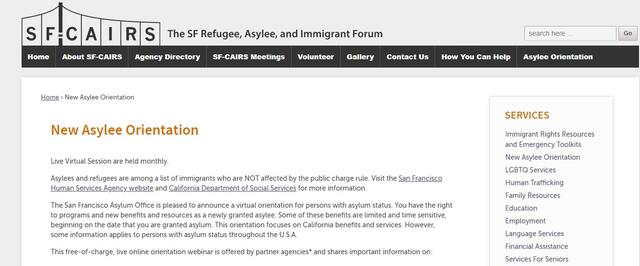
Imagine getting permission to stay in a safe new host country after escaping danger back home, but having little idea of what help and resources are available.
This is the situation facing many people who obtain political asylum in the United States. Unlike refugees, who are granted asylum before coming to the United States and receive an orientation before they arrive, most asylees who come to the U.S. are on their own.
Starting this month, the IRC offices in San Jose and Turlock/Modesto have teamed up with the federal government to provide virtual orientation services for asylees, replacing in-person orientation services formerly provided at the U.S. Citizenship and Immigration Services asylum office in San Francisco.
“This new asylee orientation is phenomenal,” said Katharina Beeler, an instructor at the IRC in Turlock/Modesto who is co-hosting orientation sessions with Economic Empowerment and Education Manager Yasmeen El-Farra. “It covers all of the questions that asylees would have right from the beginning.”
Asylee participants learn about topics such as the U.S. education system, employment rights, immigration matters and other legal issues, and government agencies and benefits. The monthly virtual presentations are being offered to new asylees in California, Oregon and Washington.
Yasmeen and Katharina are co-hosting the orientation with officials from the state Department of Public Health. Meanwhile, a four-person team from the IRC in San Jose prepared slides for the orientation and is handling questions from attendees at the virtual sessions. IRC San Jose participants are Senior Career Development Coordinator Kevin Davis, Employment Program Coordinator Elgiva Wood, Youth Program Coordinator Andrea Vidal Becker and Casework Coordinator Asefeh Mazraeh.
In addition to their role with the orientation session, the San Jose representatives are gathering data about resources from various counties throughout the western United States. In addition, IRC Turlock/Modesto intern Marissa Seaman is assisting with resource mapping for the San Joaquin Valley.
Both Andrea and Elgiva of the San Jose office previously attended in-person orientation sessions at the USCIS asylum office in San Francisco prior to COVID-19 as a way to inform new asylees about IRC programs that are available to them. Those include the federal Match Grant program, which provides economic and casework support to help refugees and asylees obtain rapid self-sufficiency.
The new virtual program will not offer IRC staff the same face-to-face interaction with asylees that they previously experienced, as all attendees will be anonymous. At the same time, attendees will receive a list of organizations providing services in their area, including those offered by the IRC.
“It puts our organization front and center,” Elgiva said.
Interpretation services will be offered in Spanish and eventually in Mandarin through Tarjimly, a translation service that some IRC offices are using for daily interpretation needs.
Yasmeen noted that the virtual setting will make the orientation more accessible to the broader public, as people needed to travel to San Francisco for these services in the past. This will particularly be helpful the rural Central Valley, which has a large number of asylees from Central America.
“Especially in the Central Valley, we have a disproportionate number of asylees, but they’re underserved,” Yasmeen said.
Andrea expressed enthusiasm for the new program, noting that the resource work is not only putting the IRC in touch with new partners, such as immigration attorneys, but it is also allowing IRC staff members throughout Northern California to collaborate more closely together.
“I think it’s really cool that we’re doing this with Turlock,” she said.